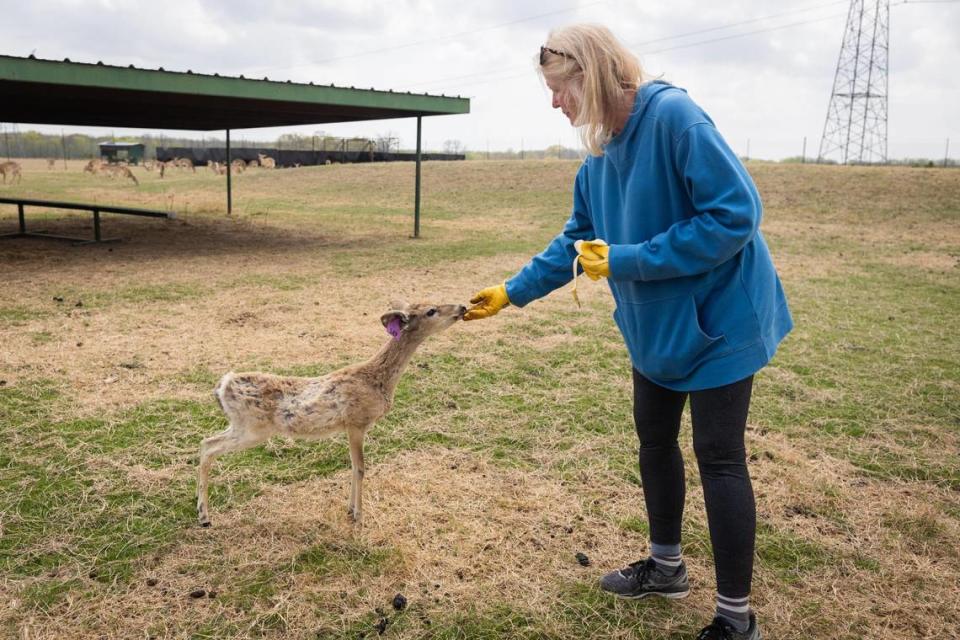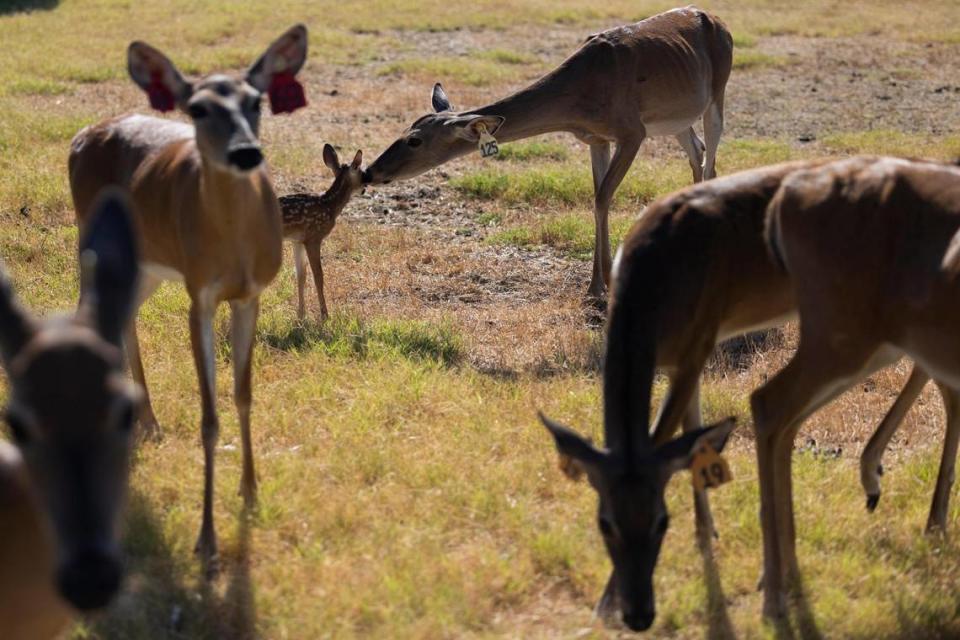A Texas rancher is fighting the state to save his deer herd. He just won a small victory.
- Oops!Something went wrong.Please try again later.
In a second-floor courtroom in Kaufman County last week, a judge listened to nearly 10 hours of debate over the fate of a rancher’s herd of 400 whitetail deer.
On one side of the courtroom, rancher Robert Williams sat with his attorneys; his supporters filled six rows of benches behind him. On the other side, attorneys for the Texas Parks and Wildlife Department.
Scores of deer on Williams’ ranch east of Dallas have tested positive for a contagious and fatal disease called chronic wasting disease. CWD is in the same family as mad cow disease and scrapie, but it’s specific to deer. Because of the herd’s positive tests, the state says the deer need to be killed — but those plans have been repeatedly thwarted by Williams and his attorney Jennifer Riggs.
Typically, Parks and Wildlife would depopulate a herd with significant numbers of CWD positives long before it reached the scale of the outbreak at Williams’ farm, RW Trophy Ranch. The state has the right to do that, its lawyers contend, because breeders agreed to the state’s rules when they obtained permits and because whitetail deer are technically wild animals. In Texas, wild animals are property of the state, even as ranchers buy and sell the animals, breed them and hunt them.
But in a case that may be the first of its kind, Williams is suing the Parks and Wildlife Department for fuller ownership rights of his deer, which includes the right to decide whether they live after testing positive for CWD. Even after the case was filed, though, the state continued to issue depopulation orders for the farm, which forced Williams and his attorney to scramble for restraining orders.
In last week’s hearing, Judge Bobby Rich ruled that the state cannot cull Williams’ deer while his challenge against the state is still pending. And that means the rancher’s case, which has the potential to fundamentally shift property rights in the whitetail deer breeding world, is now scheduled to go to trial early next year.

Williams’ daughter Maree Lou Williams, who’s in charge of caring for the ranch’s deer, said Friday’s ruling felt like “a little breath.” While her deer are protected for now, she still doesn’t know what might happen at trial.
“It’s like … you’re still drowning,” Maree Lou Williams told the Star-Telegram. “There’s this part of me that’s like, ‘Would it be better if we just go ahead and drown me now?’ Or do I try to grasp for another breath of air?”
As the case has haltingly moved through hearings, the deer on the ranch have continued to eat, sleep, breed and, according to state data, spread CWD. The ranch now has the largest number of CWD positives ever seen in a Texas breeding facility, according to Dr. Hunter Reed, a wildlife veterinarian for the Parks and Wildlife Department.
And state officials are concerned that the disease could continue to spread, even as the case drags on.
A large outbreak
Williams breeds his whitetail deer with the goal of raising aesthetically pleasing bucks to sell to other breeders or to trophy hunters. The industry as a whole has a direct economic impact of about $350 million per year, according to a 2017 report.
Williams, with his decades of experience, is among the oldest breeders in the state. But in 2021, he was hit with the news that every rancher dreads: One of his deer had tested positive for CWD.
That first positive test came after the February 2021 freeze, when Williams submitted samples of several dead deer for mandatory state testing. Over the past two and a half years, his ranch has turned up many more positives, but Williams has declined CWD containment plans suggested by the Texas Parks and Wildlife Department. He’s called those plans onerous and punitive, in part because they would’ve required Williams to kill at least some of his deer.
After Williams declined to sign a herd plan, Parks and Wildlife turned instead to a full “depopulation” plan, intending to kill Williams’ entire herd in order to prevent the disease from spreading further, including into the free-ranging deer population.
But Williams, through a lawsuit, has done something highly unusual: He’s held the state off of his property and, through temporary restraining orders, prevented the state from killing his CWD-positive herd.

As the case has wound its way through the court system — including a stop on the front step of the state Supreme Court, which declined to hold a hearing — Williams’ herd has remained alive.
But at the same time, the CWD outbreak has festered. At Williams’ farm, there had been 124 positives when the hearing started Aug. 23, which already made it the largest number of positives the state has ever seen in a breeding facility. The number climbed to 125 by the time the hearing wrapped up on Friday, Aug. 25.
Until last week’s court ruling prevented the state from acting on depopulation orders, Parks and Wildlife had repeatedly scheduled kill dates for Williams’ deer. When Rich granted a temporary injunction to Williams, though, he ensured that the state would halt those actions until a full trial
Parks and Wildlife officials have repeatedly said that, at this point, killing the herd is the only way to keep the outbreak from spreading further, particularly outside of the bounds of Williams’ farm.

The risk
Between the two trial days, the Parks and Wildlife Commission made another move connected to the ranch’s CWD outbreak.
The commission, which is an appointed body that oversees the department, on Thursday established a new containment zone in Hunt and Kaufman counties. That new zone enshrines an emergency order that had already been in place in the area after free-ranging deer on a ranch release site tested positive earlier this year.
Containment zones aim to prevent CWD from spreading. Breeders in containment zones are restricted from moving deer, and hunters who harvest any deer in a containment zone are required to have those animals tested for CWD before they take any piece of the animal out of the zone. (There have been no documented cases of CWD harming humans or jumping to humans, but the U.S. Centers for Disease Control and Prevention advises against eating the meat of a CWD-positive animal.)
[MORE: Two days at a Texas whitetail deer auction]
CWD response and containment is made more difficult because it’s a slow-moving disease, meaning deer may be infectious long before they show symptoms. The disease, when carried through to its final result, leaves deer looking skeletal, acting disoriented and drooling excessively.
There’s no vaccine or treatment for CWD. Eventually, every deer with CWD will die, although Reed, the wildlife veterinarian, testified that many animals will die first of something else, because of their weakened state.
Williams, for his part, doesn’t agree with the state’s risk evaluation.

Throughout the last year and a half, the rancher has repeatedly said that CWD is more of a political disease than a real threat and has cast doubt on the legitimacy of the state lab’s test results. During last week’s hearing, Williams’ attorney, Jennifer Riggs, told the court that their side believes the state’s ultimate goal is to run deer breeders out of business.
A witness for Williams’ side, wildlife biologist consultant Daniel Van Schaik, likened CWD to prostate cancer, in that testing may return positives even in cases where the disease will not develop into a problem until after the host’s death. Van Schaik said Williams’ deer looked healthy when recently surveyed.
“If you don’t test, you’ll never know you have it,” Van Schaik told the court.
Testimony from state’s witnesses and information from the CDC counter this testimony. Additionally, unlike prostate cancer, CWD is contagious.
A 2024 trial date
Last week’s hearing offered a glimpse of the arguments that each side may bring to the trial, which has now been scheduled for Feb. 27, 2024.
By the time of the trial, Williams’ case will have been in the Kaufman County courts for two years. After holding off the state for this long, Williams has also managed to wait out an old state rule on depopulation costs.
After a new law passed this summer, the state can now waive the cost of depopulations at deer ranches. If the state had killed Williams’ herd last year, he would’ve been responsible for the cost of the operation. But now, the state would shoulder that cost.
That means that, even if Williams deer are eventually depopulated, the process could be less costly for him — not counting his attorney fees.

